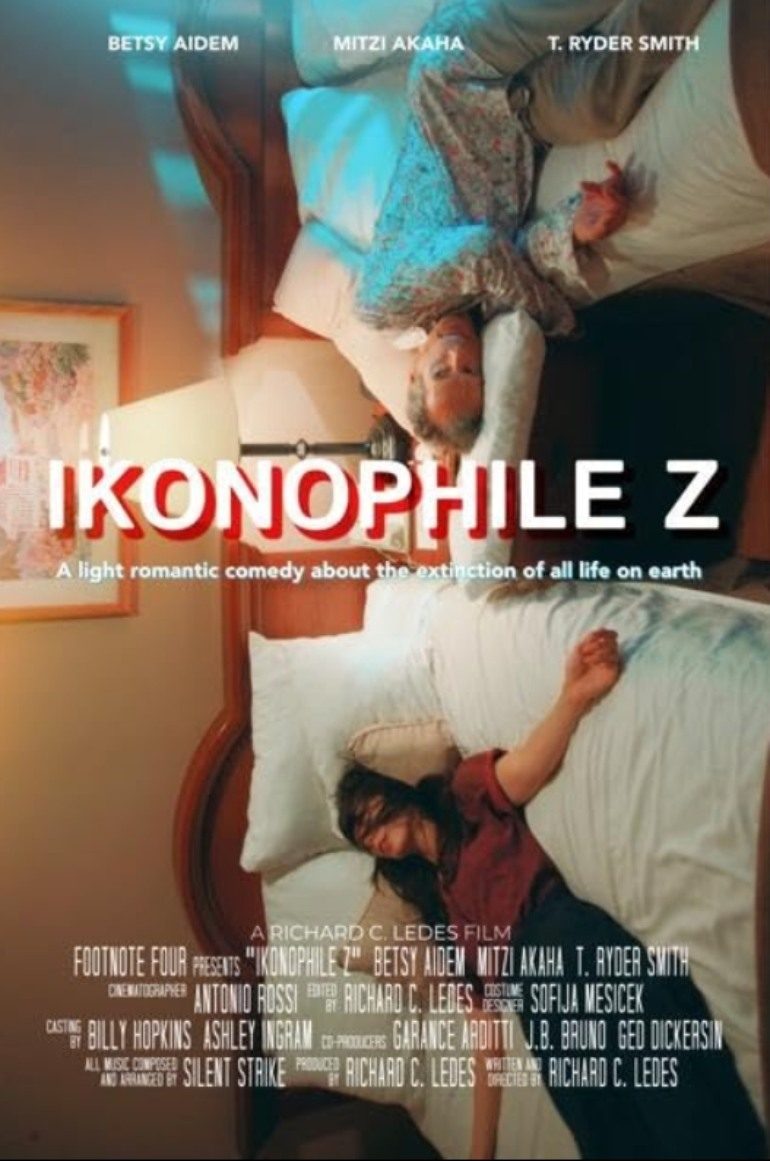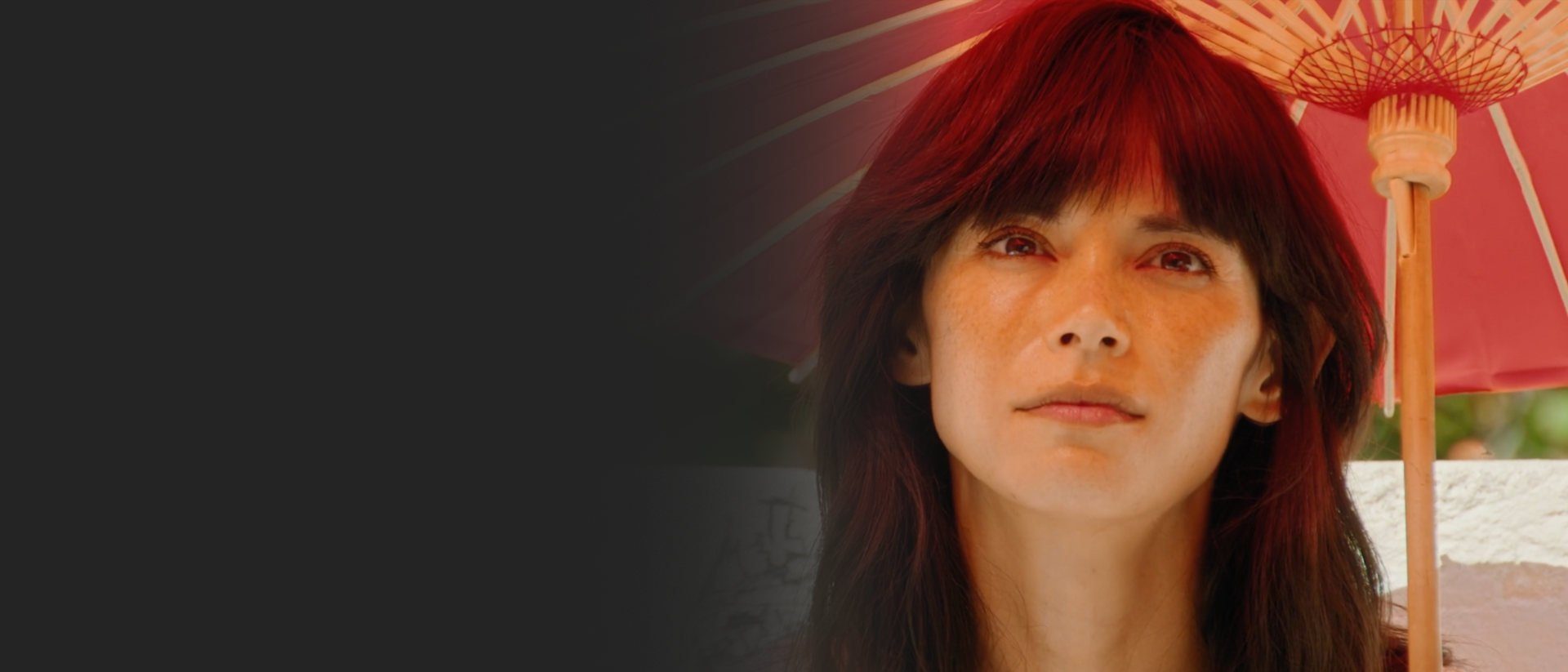

Ikonophile Z, touted as a light romantic comedy about the extinction of all life on Earth is anything but a light watch. Weighty with topical current events and a “Philadelphia cheese steak of jargon,” – yes, that is in fact a line uttered onscreen- Ikonophile Z is a film made to suit the palettes of collegiate film students, political pundits, and philosophers, but will do little to entertain the general, streaming service audience.
While the stationary nature of the cinematography is a unique stylistic choice that might have made for a thought-provoking viewing experience before Here reinvented the wheel, the overall impression is that of a film major’s raw passion project. The style is distinctive and clearly intentional but lacks visual interest. If a scene is not appealing through movement, it stands to reason it should be appealing through color, or texture, or weather. But in Ikonophile Z, Ledes sticks to simplistic, greenery backgrounds that lack any real visual gravitas. The color palette is unassuming, the lighting is non-existent, which is to say it is not designed, but borrowed from the great outdoors, resulting in a film that feels a bit unpolished and half-finished.
That said, Ikonophile Z is not without its merits. The actors deliver their lines commendably in a film where the cuts are few and far between and the dialogue is riddled with philosophy, religion, and scientific jargon that would make the swiftest tongues stiff. Each actor is interesting to watch on screen, embodying their respective characters with seemingly little effort, delivering each minefield monologue with enviable nonchalance; as if talk of Marx and Stalin and bird drones are the casual poeticism everyday lovers dream of.
There is, however, a sharp contrast in the enjoyability of the scenes shared between Laura, played by Mitzi Akaha, and Chris (T.Ryder Smith) and those between Chris and Vanessa (Betsy Aidem). With Laura, the conversation is riddled with quips about pot brownies and questions about whether Chris prefers dogs or cats as pets. And these goofy asides lessen the heaviness of an otherwise philosophy heavy script and remind the viewer that at the end of the day, even the greatest philosophers possess a good measure of silliness. In contrast, the scenes with Vanessa are laden with circular arguments that are as difficult to follow as a ball of yarn batted about by a mad cat. With the cat analogy being more exciting than Vanessa’s dialogue, it is not hard to see why certain parts of this film are a drudge to watch. Of course, this is no fault of Aidem, who tries her darndest to shape the dense material into something more enjoyable, sprinkling it with notable (often admirable) hills and valleys of emotion.
A Note: It is possible, the drudgery of Vanessa’s scenes mimic Chris’s day-to-day drudgery through a post-pandemic America, or function as a testament to the chameleon-like adaptability of Chris, who changes his personality in tandem with his lover. But it is hard to say for certain in a film pockmarked by odd decision making.
The most evident kernel of joy in Lede’s Ikonophile Z is the humanness of the language. The viewer gets the sense they are not watching a film, but a series of conversations they might observe as a passerby on the street. Each scene unfolds like a play, opening with a title card and ending when the next title card falls. Within the scene the actors simply talk. Of highs and lows, the good and bad, weighing the pauses with thought and filling the quiet with intention. No words are wasted, no breaths are misplaced. When the banter flows, it flows beautifully. But I’m woe to say, when the banter stalls, it stalls like a buffering Youtube video.
The nowness of the writing is at times dense and clunky, if not preachy. Chris, a writer caught in the midst of a love triangle between a young photographer and middle-aged crutch, tangentially rambles about the commercialization and capitalistic nature of Black Lives Matter, before discussing the merits of Marxism, the social effects of Covid, and a slew of other hot-topic issues that feel both overly topical and simultaneously outdated. The dialogue, so brilliantly witty in one scene, is a slog through adverbs, big words, and tongue twisters in the next.
My final ranking: 2.5/5
So, what’s the consensus? Ikonophile Z is definitely not a blockbuster worth penny-pinching to see in a theatre. And is, undoubtedly, weighed down with tired arguments, self-indulgent politicking, and stale cinematography, but does that mean it’s not worth a watch? Not necessarily. Ikonophile Z is worth a watch if you enjoy films centered on philosophy with minimal action and simple staging. It’s a film for the viewer that doesn’t mind narrowing their eyes in thought and switching on the subtitles to follow more closely. But, if you, like me, prefer a film with glittering sets, soaring music, and sweeping imagery, then you’ll want to add Ikonophile Z to your skip list.


